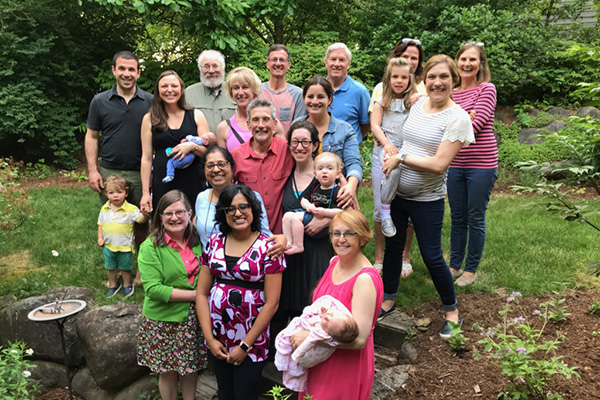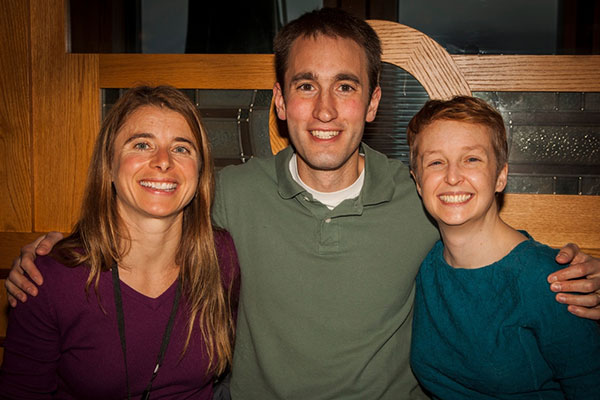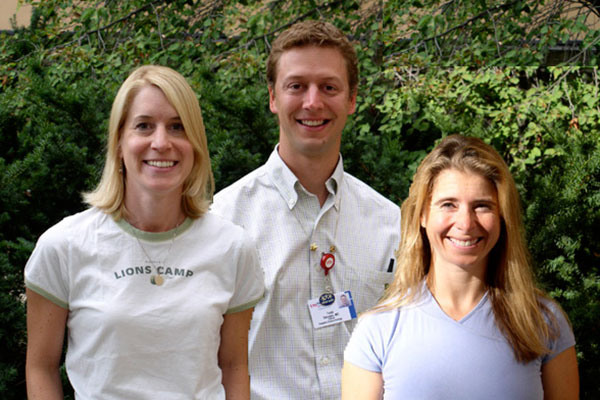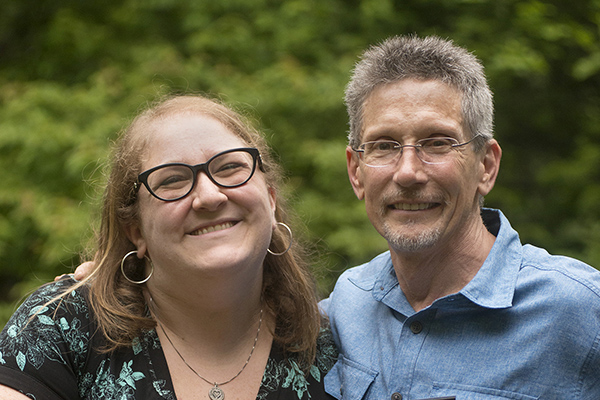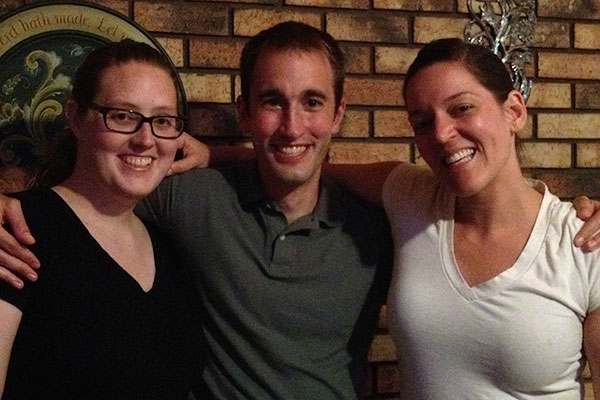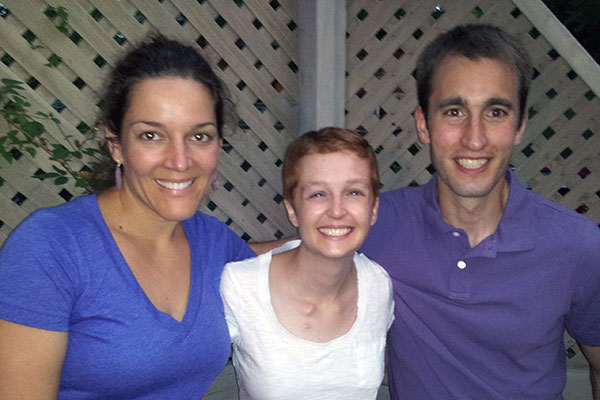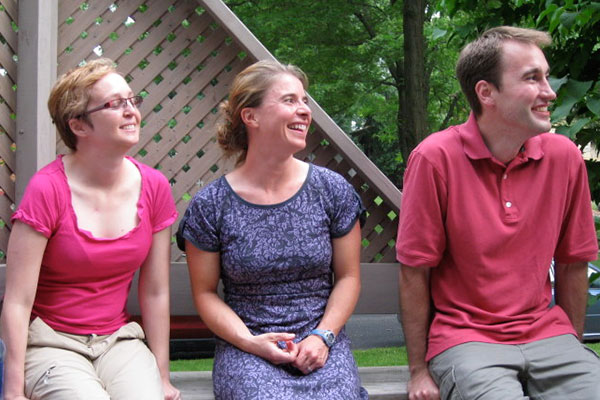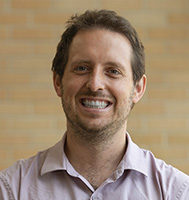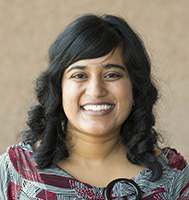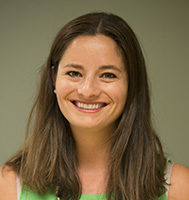Our fellowship program is designed to help you succeed as an academic pediatric endocrinologist by developing your skills as a clinician, physician researcher, and teacher. The UW Pediatric Endocrinology program provides unique opportunities for fellows to participate in national and international committees, conferences, and research programs that set the stage for a successful career as a leader in pediatric endocrinology.
Our Program
Our People
- Tim Livett
- Santhi Logel
- Erika Zevin
- Elizabeth Mann
- Yashoda "Mita" Naik
- Lauren Kanner
- Robert Strait
- Allison Pollock
- Tasa Seibert
- Kim Henrichs
- Peter Wolfgram
- Jennifer Rehm
- Vanessa Curtis
- Lindsey Nicol
- Todd Varness
- Jen McVean
Fellowship Dates: 2020-2023
Current Position: Pediatric Endocrinologist at Mary Bridge Children’s, Tacoma, WA
Santhi Logel
Fellowship Dates: 2019-2022
Current Position: Pediatric Endocrinologist at UVA Children’s in Charlottesville, VA
Why did you choose UW Pediatric Endocrine? UW was the perfect place for me to train during my pediatric endocrinology fellowship. After completing my pediatric residency at UW, I decided to stay for fellowship because of the comprehensive clinical experience, abundant research opportunities and most importantly, dedicated and supportive people.
What’s the best advice you were given at UW? Lab results are never “normal” and the clinical context should always be taken into account when interpreting results.
How did UW Peds Endo prepare you for your current position? My clinical experience during fellowship was broad. I felt prepared to manage common pediatric endocrine conditions and came to appreciate the nuances of individual cases. I also felt prepared to manage rare cases as I guided patients and families and led multidisciplinary teams through complex diagnostic challenges and novel therapeutic approaches.
Going into fellowship, I did not think research would be a part of my career. My research experience during fellowship changed my mind! With the help of my mentors, I was able to hone in on research questions and projects that were interesting to me. As I gained research skills and developed projects, I have been fortunate to network and collaborate with researchers across UW and other pediatric academic medical centers during and beyond fellowship.
What are your favorite or surprising memories of UW? My favorite memory of UW was my graduation party. We got together at Dave’s house for a cookout with Southern food in honor of my new attending position. What really touched me though were all the heartfelt stories and memories that we shared.
What makes UW unique? The people! People within and outside of the division truly cared about my success as a fellow and my wellbeing as a person. I established strong relationships during residency and fellowship that have continued long after leaving UW.
Fellowship Dates: 2018-2021
Current Position: Assistant Professor of Clinical Pediatrics, Indiana University School of Medicine
Why did you choose UW Pediatric Endocrine? I knew I wanted to go to UW for my Pediatric Endocrinology Fellowship immediately during my interview day. I felt so welcome and could tell immediately how supportive and dedicated to education the faculty were. I was really impressed with the fellow education session run by Dr. Allen, the chair of the department. I am so thankful that I was able to do my fellowship at UW, I had a wonderful experience there and definitely felt well-prepared for practice.
What’s the best advice you were given at UW? The best advice I was given was to really understand and feel comfortable with the physiology of the endocrine system rather than just memorizing facts and associations.
How did UW Peds Endo prepare you for your current position? During fellowship at UW, I was exposed to a variety of disorders and faculty would be sure to prioritize rare and educational patients for our fellow clinics. Focus on clinical education continues throughout all three years of fellowship, so I felt well prepared for practice by the end of my training.
I also absolutely loved and valued the weekly Tuesday morning fellow education sessions and interesting case sessions – so critical for learning the physiology, exposure to key papers, and learning from rare and educationally-valuable cases.
What are your favorite or surprising memories of UW? My favorite memories are from some of the conferences we went to where we all got to celebrate being together and catch up with former fellows. I got to know the faculty so well outside of work which I loved.
What makes UW unique? The mix between being a large academic center and a hospital for the community. The focus on fellow education from outstanding educators. The feeling of value the fellows have within the division. The exposure to both common and rare pediatric endocrine conditions and concerns. The feeling of camaraderie among the faculty, fellows, nurses, and staff.
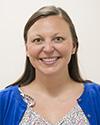 Elizabeth Mann
Elizabeth Mann
Fellowship Dates: 2017-2020
Current Position: Assistant Professor, Clinical Health Sciences Track, Pediatric Endocrine and Diabetes, UW School of Public Health, American Family Children’s Hospital
Why did you choose UW Pediatric Endocrine? I am so glad I chose a fellowship program that really focuses on fellow education and experience. It was clear from my interview day, and continued to be true during my 3 years, that all the faculty are committed to the personal growth of each individual fellow. I came from a relatively large residency program in which much of our education came through experience. I wanted my fellowship training to prioritize experiential learning, too, but knew that to gain competency in the complicated world of endocrinology I needed a program that focuses on learning pathophysiology and applying this to case-based learning.
What’s the best advice you were given at UW? Now that I am practicing endocrinology as an attending, I appreciate the perspective from our faculty about how to manage clinical ambiguity. This was one of the most challenging things to learn in endocrinology, and through their guidance I am starting to feel comfortable developing management plans that allow for this. Sometimes we all need to use “the tincture of time!”
How did UW Peds Endo prepare you for your current position? I was very glad to be offered a position as an assistant professor here in our division upon fellowship graduation. I feel very well prepared to handle the clinical load of both complicated endocrinology and diabetes clinics. Our program also incorporates so much teaching opportunities that I feel well-equipped to move into the teaching physician role. Finally, I was well-supported during fellowship to pursue my research interests in quality improvement so feel like I am in a great position to continue this research work as a faculty person.
What are your favorite or surprising memories of UW? One thing I was so pleasantly surprised with was during my first year of fellowship when we held our division retreat. This was a half-day session with nurses, faculty, fellows and support staff and we spent all afternoon brainstorming and goal-setting for how we wanted to work together to improve our division. Even as a first year fellow, I was invited to participate and share my experiences and perspectives and felt my input was really valued. And through the years, we have worked together on program improvements. It is refreshing and energizing to see how valued all members of the team really are, and that we all feel like we can work together to continually improve the way we educate our learners and ultimately care for our patients.
What makes UW unique? The way our interdisciplinary teams work together is truly unique to other programs. Our nurses are valued members of the team and take a real ownership of supporting fellow education. And the fellows get to be involved in operational level for our endocrine and diabetes clinical programs, but also at the clinic and hospital-level, too. The hospital leadership is very inclusive of learners, which allows really diverse experiences for fellows who are interested in developing professional and leadership skills.
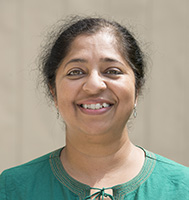 Yashoda “Mita” Naik
Yashoda “Mita” Naik
Fellowship Dates: 2016-2019
Current Position: Faculty in Pediatric Endocrinology and Diabetes at Marshfield Clinic
Why did you choose UW Pediatric Endocrine? I chose UW pediatric endocrine program as I was impressed of the dedication of each and every member of team to teaching of the fellows. Most important to me was that the focus was on fellowship training and furthering individual interest of each fellow.
What’s the best advice you were given at UW?
- Lab results are “ not normal but rather appropriate or inappropriate”
- If you apply yourself, you can do anything.
- “Know what are you treating”
How did UW Peds Endo prepare you for your current position? I credit my three years during fellowship for forming a strong foundation of knowledge. Fellowship at UW prepared me extremely well not only as a clinician but also as a teacher and mentor to residents. The training enables me to find solution to the system problems that I face. As an endocrinologist, the years strengthened my curiosity, interest and love for the subject and encouraged me to question and research.
What are your favorite or surprising memories of UW? My favorite memories include time spent in “Geezer” sessions with other fellows. I will always cherish the department camaraderie exemplified at our annual Christmas party with special song written and performed by fellows, accompanied by Dr. Allen, the program director. Also the friendly chats among the fellows and faculty as we all enjoyed “Babcock – UW dairy”ice cream.
What makes UW unique? UW pediatric fellowship is unique for providing an atmosphere where you can succeed without feeling the pressure. Fellows are encouraged to do research and given full support. “Geezer” and special teaching sessions are intellectually stimulating and prepare fellows for the board exam as well as to practice as clinicians. This program nurtures special qualities in each fellow which is the most unique and special characteristic.
 Lauren Kanner, MD
Lauren Kanner, MD
Fellowship Dates: 2015-2018
Current Position: Clinical Assistant Professor of Pediatrics – Endocrinology and Diabetes, University of Iowa Carver College of Medicine
Clinical Interests: Polycystic ovarian syndrome, reproductive endocrinology, general endocrinology, childhood obesity, type 1 diabetes, type 2 diabetes, transgender health
Research Interests: Ovarian pathology, quality improvement in transgender and diabetes care
Why did you choose UW Pediatric Endocrine?
I chose UW Pediatric Endocrinology for my fellowship training because of the people I met on my interview day who demonstrated amazing cohesiveness in the departments with the opportunities to put the fellow at the central of their goals making for amazing mentorship. I also chose UW due to the wide breadth of disease pathology seen as a fellow with clinical service spread throughout the three years of training so I could continue to hone my skills as a clinician and learn how to time manage research and education projects with clinical service and learning.
What’s the best advice you were given at UW?
If you want to be part of an experience or project, see a specific patient or type of pathology, or need help understanding a specific issue, speak up and ask for it. The faculty are working to provide you with optimal opportunities to learn and grow.
What advice would you give to new fellows joining the UW Peds Endo program?
Know why you are ordering tests, what you are treating and what the end goals of treatment are, if known. Use your resources including the other fellows, nurses and faculty – they are a wealth of knowledge and love to help. Don’t be afraid to ask for what you need or want out of fellowship because the faculty and staff will help make fellowship the most profitable for you if you advocate for your interests, strengths and weaknesses. Accept challenges or project/patient experience offers that may not be in your realm of interest or comfort if you have the time and opportunity in case that ultimately helps grow your passion.
How did UW Peds Endo prepare you for your current position?
During my fellowship time I learned how to balance outpatient clinic responsibilities, phone calls and inpatient care during service weeks and progressing with scholarly activities which is what is a skill required for balancing responsibilities in my faculty position. The UW faculty also provided me with the opportunity to explore my interests in specific pathologies including supporting my involvement in a national organization and attending the yearly meeting in addition to the PES meeting which allowed me to become more comfortable with this patient population which led me to be a good fit for my new division who needed someone interested in seeing these specific patients and allowed me to develop a new multidisciplinary clinic to provide this patient care.
What are your favorite or surprising memories of UW?
David Allen’s geezerisms from our fellowship education conferences will always be favorite memories. Other favorite memories will be all of our conversations, laughing, and advising each other in the fellow’s office and Tuesday night fellow outings which really cemented our bond as not just cofellows but friends.
What makes UW unique?
The fellows are completely integrated into the division and their opinions are valued, both at monthly division meetings, during fellowship interview season, and informally in clinic, on the wards, and casual conversations on how to improve the division, our education and patient care.
 Robert Strait, MD
Robert Strait, MD
Fellowship Dates: 2014-2017
Clinical interests: transgender medicine; growth failure despite normal growth hormone, e.g. renal failure, cystic fibrosis, chronic glucocorticoid therapy; defects in handling of electrolytes and fluids, e.g. diabetes insipidus, adrenal insufficiency, hypoparathyroidism; social and implementational challenges of treatment for type 1 diabetes.
Research interests: long-term outcomes for therapeutic approaches to transgender adolescents; oral medications in pediatric type 2 diabetes.
Why do you choose UW?
I was wooed to choose UW Pediatric Endocrinology for fellowship by experiences with the faculty during pediatric residency at UW. The combination of intellectual rigor and warm conviviality in the division is a balance of wealth that would be difficult to better, and the intimate, comfortable size of the institution belies the broad exposure to pathology that it affords. This all makes for an ideal training environment, which convinced me to stay put in Madison after residency rather than seek out a new institution; I remain convinced that it was an excellent choice.
What do you remember learning during fellowship that continues to stand out?
The best clinical advice I received during fellowship was to know well and good what you think you’re treating before prescribing, but furthermore to keep in mind that just because your treatment is rational and sound doesn’t mean that the results will be as predicted. The reflective avoidance of both over reliance on algorithms and haphazard treat-and-see approaches is the hallmark of specialty medicine, and the universal need to be at peace with uncertainty is especially true of our specialty.
Any memories from fellowship you’d like to share?
The fondest memories I have of fellowship are the banter and the clinical musings across the table at Tuesday-morning education rounds and across the room in our fellow’s office. When it’s a joy to go to work, you are primed to take the most from it and give the most to it.
 Allison Pollock, MD
Allison Pollock, MD
Mentors: David Allen MD, Michael MacDonald MD, Mei Baker MD, Pam Kling MD
Fellowship Dates: 2013-2016
Current position: Assistant Professor, Pediatric Endocrine and Diabetes, University of Washington School of Medicine
Awards:
- 2015 – Selection to 2015 Pediatric Endocrine Society Spring Retreat
- 2014 – Presidential Poster Award. Pediatric Endocrine Society. Pediatric Academic Society Annual Meeting in Vancouver, BC.
Interests: technological resources (ex: electronic medical record, telehealth and patient-friendly online tools) to improve health related to endocrinologic conditions such as diabetes; maternal-fetal transmission of obesity and type 2 diabetes,; and ethical issues in endocrinology.
Why did you choose UW Pediatric Endocrine?
When I learned about the program, interviewed and rotated with the team, the mentorship and collegiality of the division really stuck out to me compared to other programs across the country. Between the nurses, faculty, fellows and staff, everyone was engaged and interested in the success of their peers as well as the entire team. The fellows in particular seemed to be happy, dynamic and interesting people and the program director and faculty seemed to really care about the personal and professional development of each individual fellow.
What’s the best advice you were given at UW?
A few great ones:
- Know what you’re treating
- Never say never or normal in endocrinology
- If it makes no sense, it doesn’t mean it’s wrong
What advice would you give to new fellows joining the UW Peds Endo program?
Keep asking questions, use your imagination, and listen to your patient’s stories.
How did UW Peds Endo prepare you for your current position?
My fellowship training gave me a framework to approach familiar and unfamiliar questions rather than a cookbook approach – this made me comfortable as I transitioned into my role as faculty.
 Tasa Seibert, MD
Tasa Seibert, MD
Fellowship Dates: 2012- 2015
Current position: Assistant Professor, Clinical Track, Rainbow Babies and Children’s Hospital at University Hospitals, Case Western Reserve University. Assistant Director Global Child Health
Interests: Disorders of sexual development, Congenital adrenal hyperplasia, general endocrinology, disparities in healthcare, childhood obesity
Why did you choose to do your Pediatric Endocrinology fellowship at UW?
I chose UW because of people. The faculty are supportive and committed to fellow education, the support staff are amazing and your co-fellows are always there for you. Together this creates an environment that is not only optimal for learning, but also fun and enjoyable.
What makes UW unique?
The UW peds endocrine fellowship is unique because it is truly fellow-oriented. The staff is committed to ensuring every fellow receives the best possible education and are willing to adjust the program to meet the fellows’ needs. For example, during fellowship staff encouraged me to continue pursuing my interests in global and public health. As a result, I had the opportunity to continue working internationally and was able to obtain a Masters of Public Health during fellowship.
What are your favorite memories of UW?
My favorite memories are learning and laughing with my co-fellows in the fellow’s workroom and geezer sessions. Outside of work, I enjoyed playing soccer with other UW residents/fellows and hanging out at the Memorial Union terrace.
 Kim Henrichs, MD
Kim Henrichs, MD
Fellowship Dates: 2011- 2014
Current position: Assistant Professor, Pediatric Endocrinology, Baylor College of Medicine, Children’s Hospital of San Antonio
Why did you choose UW Pediatric Endocrine?
The division is particularly close knit with faculty who are experts in their fields, and yet who love to teach and are invested in the training of their fellows. When I interviewed here for fellowship, I knew there was something special in the way that every faculty member had a level endocrine mastery that I wanted to learn from.
How did UW Peds Endo prepare you for your current position?
My choice opened up many doors of opportunity including: acquisition of exemplary clinical skills, access to work in one of the few multi-disciplinary PCOS clinics in the country, the opportunity to watch a new transgender clinic develop, bench research experience in a National Primate Center, the chance to peer review publications for academic journals, publication opportunities outside of my individual research project, involvement in national committees, and supportive development of my skills as an educator. I am so grateful for my time at the University of Wisconsin.
 Peter Wolfgram, MD
Peter Wolfgram, MD
Fellowship Dates: 2010-2013
Current Position: Assistant Professor, Clinical educator, Medical College of Wisconsin in Milwaukee, Wisconsin
Why did you choose to do your Pediatric Endocrinology fellowship at UW?
I chose the UW program because of the strong clinical mentors and excellent opportunities to pursue basic, clinical, and translational research.
What’s the best advice you were given at UW?
“Know what you are treating.”
What advice would you give to new fellows joining the UW Peds Endo program?
Feel free to ask thoughtful questions, because you never know where they will lead.
What are your favorite memories of UW?
Many of my favorite memories are from weekly fellowship director rounds (Geezers) with Dave Allen when fellows would discuss physiology and complicated patients. Also, I really appreciated the camaraderie of the division, that was fostered by activities like division parties with the whole faculty and staff to celebrate Holidays and graduations of senior fellows.
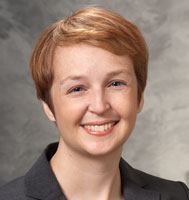 Jennifer Rehm, MD
Jennifer Rehm, MD
Fellowship Dates: 2009-2012
Assistant Professor – tenure track, Pediatric Endocrine and Diabetes, UW School of Public Health, American Family Children’s Hospital
What’s the best advice you were given at UW?
Dave Allen, the UW Peds Endo Program Director, always says, “It’s not about the final product, it’s about experience of learning.” While UW fellows have been truly successful with their wide variety of research projects, it’s important to remember that the process is every bit as important as the result – after all, this is a training program and you’re a fellow, not a lab tech working on someone else’s project.
What are your favorite memories of UW?
Weekly “geezer” sessions exploring interesting and difficult endocrine patients; our annual holiday party at Tracy’s house (and the Fa-La-La Fellow’s annual endocrine-themed carol), graduation parties at Dave’s house where everyone celebrated (and roasted) the graduating fellow, and the incredible experience of being part of the UW Peds Endo family.
What makes UW unique?
You won’t find a more dedicated and supportive program, including the administrative staff, nurses, your fellow fellows, and faculty, anywhere else. UW Peds Endo fellows get the most out of every clinical experience and also have a truly unique opportunity to design and take ownership of a research project that reflects their interests and goals.
 Vanessa Curtis, MD
Vanessa Curtis, MD
Fellowship Dates: 2008-2011
Current Position: Clinical Assistant Professor, University of Iowa Carver College of Medicine
What’s the best advice you were given at UW?
We were encouraged to “live in the gray”. We learned to consider the subtleties of each individual patient and customize our approach. This was a great way to appreciate the art of medicine. I also am thankful for the advice I got at the very beginning of fellowship: “being a good specialist starts with being a good generalist.”
How did UW Peds Endo prepare you for your current position?
The fellowship at UW was a great preparation for my current position. I knew that I most wanted to prioritize clinical medicine, and as a fellow was given autonomy and responsibility to care for a broad variety of patients. I was able to design research projects that incorporated my clinical interests and which I am still pursuing. We were encouraged and provided with opportunities for educating our fellow endocrinologists, residents, patients, and medical students which was a great source of experience.
What are your favorite memories of UW?
We had so much fun in the fellow workroom, discussing patients, our projects, and just having fun. Outside of the fellowship, it was great to be in a setting with an active and supportive pediatric department and a vibrant Big10 University.
 Lindsey Nicol, MD
Lindsey Nicol, MD
Fellowship Dates: 2007-2010
What makes UW unique?
I was very happy and impressed with the faculty mentorship and the broad range of challenging medical issues I was trained to handle. All members of the Division really embrace the fellowship program and are highly motivated to mentor and teach.
 Todd Varness, MD, MPH
Todd Varness, MD, MPH
Fellowship Dates: 2006-2009
How did UW Peds Endo prepare you for your current position?
The UW Pediatric Endocrinology Fellowship is an amazing program. The knowledgeable, approachable faculty members are simply superb, offering a perfect balance of independence and oversight. The impressive breadth of clinical experiences has made me feel comfortable with the entire spectrum of endocrine disorders. Combined with a wide range of research opportunities with close mentorship, the experience is very strong preparation for either a research-based or clinical career in pediatric endocrinology.
(Dr. Varness, a treasured friend and colleague, gifted teacher and physician, and extraordinarily compassionate person passed away in August 2010.)
Jen McVean, MD
Fellowship Dates: 2005-2008
Current Position: Assistant Professor of Pediatrics – Endocrinology, University of Minnesota
Clinical Interests: Type 1 Diabetes
Research Interests: Type 1 Diabetes
Why did you choose UW Pediatric Endocrine?
I chose UW Pediatric Endocrinology for my fellowship training because of the faculty’s clear dedication and commitment to my clinical training.
What advice would you give to new fellows joining the UW Peds Endo program?
From the beginning, identify and understand what led you into Pediatric Endocrinology. Use this information to guide your clinical and research endeavors. The opportunities at UW are abounding.
How did UW Peds Endo prepare you for your current position?
My clinical training in Endocrinology was outstanding. I left feeling confident evaluating, diagnosing and treating all types of Endocrine patients after my fellowship at UW. This was extremely important for my first job as I became the first and only pediatric Endocrinologist in an underserved area.
As a pediatric Endocrine fellow at UW, I had the opportunity to give many journal clubs, case presentations and grand rounds. These foundational opportunities helped prepare me to educate others. I now educate health care providers across the country and around the world about emerging technology for people with Type 1 Diabetes.
What makes UW unique?
The interaction between faculty and fellows is collegial from day one. The faculty respected my thoughts and ideas immediately. I was valued as an integral part of the team.
